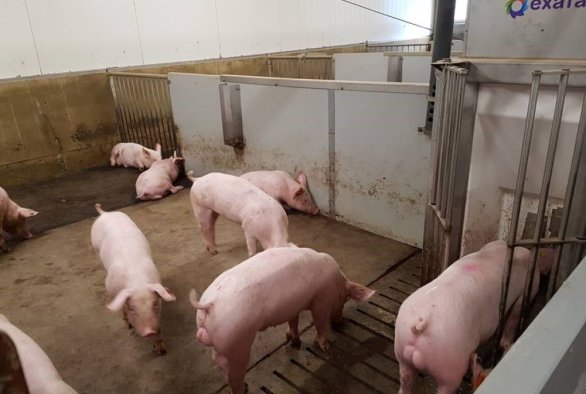Precision feed for pigs reduces environmental impact
Improved feed conversion causes animal to utilize nutrients more efficiently so it excretes fewer minerals in feces and urine.
October 2, 2020

Adjusting the nutrients in pig feed to match the actual needs of the animal will result in a much lower burden on the environment, according to a study conducted within the European Union Feed-a-Gene project of Wageningen Livestock Research.
The project was recently concluded in collaboration with 22 international partners, Wageningen said in an announcement.
Feed-a-Gene focused on improving feed conversion for pigs, poultry and rabbits in different production systems as well as on reducing the environmental impact, the announcement said. Researchers focused on feed (resources and nutrients), the animals’ genetic predisposition and how these two aspects may be better aligned. The research was carried out at Wageningen's now-closed VIC Sterksel swine research center, among other locations.
Three topics
Alfons Jansman, a senior researcher at Wageningen Livestock Research, said, "Three topics were relevant to us concerning the animal sectors: What are the actors that contribute to nitrogen efficiency and can, thus, lead to a lower nitrogen burden on the environment? How may processing technology applied to feedstock contribute to improving nutritional value, and what (genetic) animal characteristics can we use to attune the composition of feed to improve animal performance and efficiency in feed?"
Improving feed conversion causes the animal to utilize nutrients more efficiently so it excretes fewer minerals in its feces and urine. This, in turn, reduces the environmental impact of nitrogen; moreover, protein efficiency increases, Jansman said.
He explained, "We researched what processing technologies are best suited to release the nutrients in the feedstock. We considered the palatability of the feedstock. What part benefits the animal, and what part is released into the environment through excrement and urine?"
Alternative feed system
An alternative feed system was tested in Sterksel, Netherlands, in which individual animals were given an adjustable mix of two feed types, attuned to the particular animal’s unique characteristics (e.g., birth weight and genetic predisposition for protein production).
"This system may yet be too costly to be implemented, but the underlying principles and results are applicable towards furthering precision feed concepts," Jansman said.
Similar studies have been conducted on poultry in France, while France and Spain have studied the effects on rabbits. Wageningen Livestock Research worked on this study over a period of five years.
More information on the project is available from Wageningen's dossier.
You May Also Like



